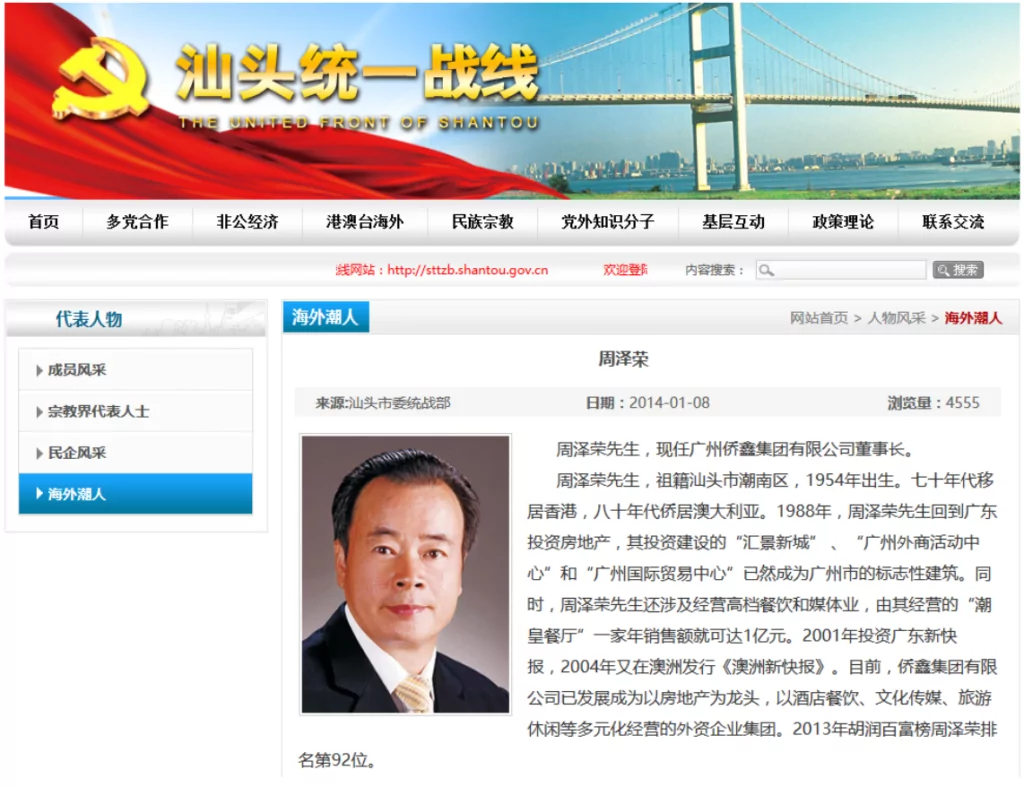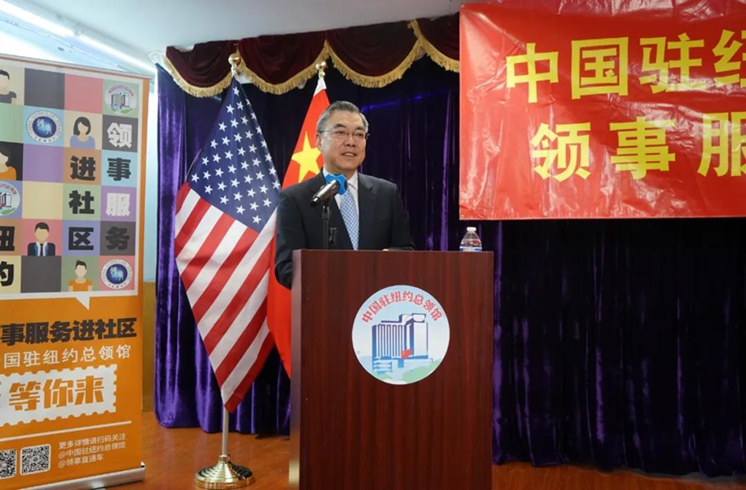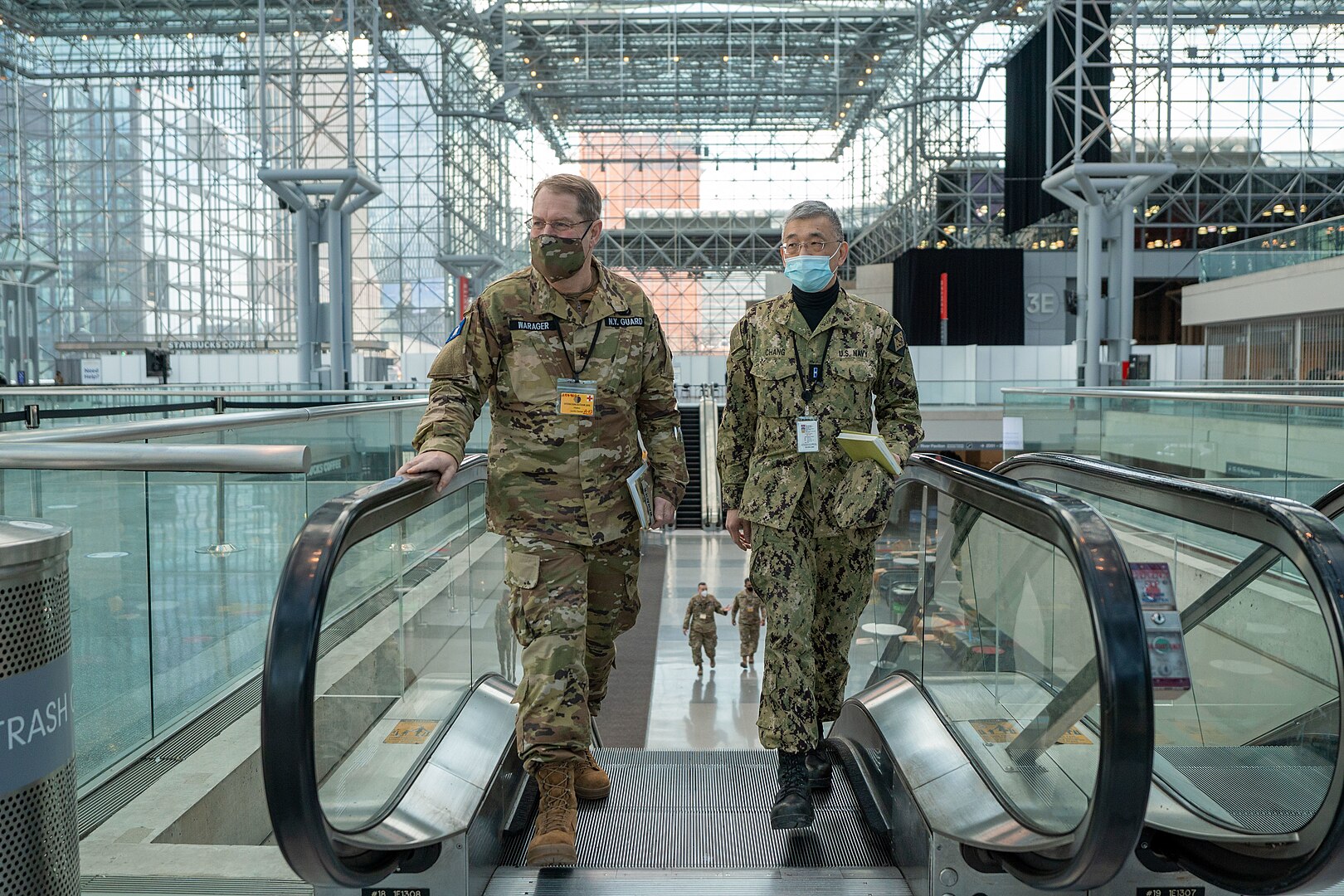
Understanding the Role of Chambers of Commerce and Industry Associations in United Front Work
Understanding the Role of Chambers of Commerce and Industry Associations in United Front Work
In 2017, following explosive allegations of CCP interference in Australian politics by mainstream Australian media outlets, real estate billionaire Chau Chak-Wing (周泽荣) sat for an interview with one of Australia’s major daily newspapers. Chau had featured prominently in the reporting that touched off the controversy, with some reports singling out his donations to mainstream Australian political parties as a key vector for CCP influence and others linking him to a United Nations-linked bribery scandal. When asked about allegations of his ties to the CCP, he responded:
For the record, I have never been a member of the Chinese Communist Party and I have never been a member of an advisory group called the People’s Political Consultative Conference. As to the entity referred to … as the “United Front Work Department,” I have no idea what this is [1].
The United Front Work Department (中共中央统一战线工作部) is the department of the CCP charged with consolidating support for Party policies among non-CCP members, including among individuals of Chinese descent overseas. It is has long been a key, albeit well concealed, element of the CCP’s foreign policy (China Brief, July 6 2017).
Chau is from the Chaozhou region of Guangdong. He immigrated to Australia in the 1980s, while continuing to run the PRC-based property business that would make him a billionaire (SBS News, May 23). Chaozhou is a particular focus of United Front activity directed at overseas Chinese, because of the region’s long history as a source of migrant outflows, and their subsequent economic success around the world. Chau’s interview claims were remarkable precisely because of his long, well-documented association with provincial and city level elements of the United Front Work Department (UFWD). Chau has been a longtime participant in and leader of industry associations for overseas Chinese from Guangdong, and has been cited as a model for overseas Chinese more generally by various levels of the PRC government and the CCP. This is reflected in his appearances on United Front websites, such as that of Shantou, a city in Chaozhou (The United Front of Shantou, January 08, 2014), and in 2016 group photographs with the head of the United Front for Guangzhou district of Tianhe, a center of commerce in one of China’s wealthiest cities (United Front of Tianhe, March 1, 2016).

Chau Chak-wing’s biography on the Shantou UFWD website
The available record of Chau’s ties with the UFWD can be dated back to July 2007, when he launched the Guangdong Overseas Chinese Commercial Investor Industry Association in the presence of the head of the UFWD in Guangdong Province, Zhou Zhenlong [2]. In his speech, Chau praised the work of the earlier Overseas Chinese Investor association established in Guangzhou in 1990, for protecting the ‘legitimate interests’ of the investors, helping solve problems and for helping to improve the quality and competitiveness of industry [3]. Chau was also direct in his acknowledgement of Zhou Zhenlong and his United Front role when launching the Guangdong Huaxing Bank in 2011. That Chau’s links to United Front work dates back to at least 2007 was also documented in a US State Department cable released by Wikileaks (Sydney Morning Herald, July 16, 2017).
A Brief History of the UFWD and Business
The UFWD’s ties with key business people through industry associations (企业协商会) is a time-honed tactic. The PRC was founded with the intention of building a communist society by abolishing all private property, businesses, and profit. These would be replaced with state ownership of all land, property and industry. Those who had been in business before 1949 were denounced as evil capitalists and exploiters of the Chinese people. The Party demanded that they hand over their property and transform themselves and their thinking from capitalism to socialism. They were forced to undergo extensive thought reform (思想改造) or brain washing (洗脑), a process so severe that those on the receiving end frequently went mad or committed suicide [4].
One of the key ways businesses were thus transformed was through the use of corporatist organizations established by the UFWD to represent them, most notably the All-China Federation of Industry and Commerce (ACFIC) for small business, and the so-called China Democratic National Construction Party for larger ones. Nearly all “bourgeois elements” (中产阶级分子) were forced to join one or the other of these organizations. Then and now, not joining these organizations is not an option [5].
Many of the members of these two organizations, if not nearly all, became scapegoats and were subjected to harsh treatment—and in some cases even torture and execution—in political campaigns initiated by CCP leader Mao Zedong, most famously during the so-called Anti-Rightist Campaign (反右运动) of 1958-1959, and the Great Proletarian Cultural Revolution (伟大的无产阶级文化革命) of 1966-1976. After Mao died in 1976, the CCP, seeking to rebuild China’s industry and commerce, called survivors back to service under the auspices of the UFWD. One of their most important tasks was rebuilding ties to prominent Chinese overseas, so as to rehabilitate the CCP’s image and encourage investment in China through a dual-track strategy that incorporated appeals to patriotism with promises of generous treatment and healthy profits [6].
The UFWD and Business Today
China’s spectacular economic rise in the years since has generated a vastly increased degree of economic and social complexity. It is one of the jobs of the UFWD to survey, understand, and manage the ways in which this complexity is to be organized, controlled, and represented. While the role of ACFIC has increased, the UFWD has also allowed a proliferation of small industry-specific organizations, with two goals in mind: to account for rapidly emerging interest groups, and integrate them into both the general political and surveillance system, and the United Front system in particular. Among these organizations are the large number of newly founded provincial and municipal ‘chambers of commerce.”
The United Front is organized along corporatist lines, and therefore creates or permits the creation of organizations—such as chambers of commerce—to cater to new social groups. In return for this license the UFWD controls or oversees their administration. Potential leaders are carefully vetted to ensure they support the CCP, as well as its key positions, even on external issues such as the status of Taiwan. Leaders are expected to publicly support the party when called upon, to promote the goals at all times, and to extend the influence of United Front work whenever possible, both at home and abroad. They are expected to use their personal influence and professional reputations to model proper behavior, and to inform the department of the needs, complaints and thinking of their members. They are often able to use these political connections to solve practical problems for the organization’s members as noted by Chau in his comments about the history of the Overseas Chinese Investors Associations.
The reward for those who pass UFWD vetting is clear recognition as political leaders, endorsed as reliable by the party. With this trust comes increased access to government and party officials, as well as access to material support for their needs, business and otherwise. If a business can help achieve party goals, then even more support is likely. The benefit of membership for ordinary members varies but often revolves around the connections made with fellow members. Political education is just part of the package. Amongst the most spectacular interventions to serve United Front work was the CCP’s rescue of Tung Chee-hwa’s shipping empire shortly before his appointment as the first chief administrator of Hong Kong following the city’s return to China (The Independent, November 24, 1996).
Putting Up a Front
Despite the above, foreigners doing business in China may never encounter the United Front aspects of Chinese businesses, because they might only ever deal with what they know of as chambers of commerce. In reality the chambers are other side of the industry association coin, part of a ‘two nameplates – one office’ policy: ‘Industry Association’ on one plate and ‘Chamber of Commerce’ on the other. Chambers of commerce provide a useful face for dealings with foreigners, while associations allow the UFWD to discretely manage more directly political aspects. Considering the recent fate of the State Administration of Religious Affairs—a government ministry that was absorbed wholesale into the UFWD—we might perhaps expect to see the same occur to the chambers of commerce (See China Brief, April 24).
Given the UFWD’s close oversight of all industry associations, their part in the wider United Front system including the CPPCCs, and the desirability of becoming a leader in one, it would be impossible for any successful Chinese business person not to know what they are or who they are dealing with. On the contrary, the more ambitious and influential one is, the more benefits to be gained and the more valuable one is to united front work. As for Mr. Chau and his association with the United Front, despite his denial of any involvement with the CCP, he appears to have received the ultimate reward: an invitation to Beijing in late November 2017 to meet Xi Jinping himself (Sydney Morning Herald, December 1, 2017).
Gerry Groot is Senior Lecturer in Chinese Studies and Head of the Department of Asian Studies at the University of Adelaide, South Australia. He has written extensively on United Front work, soft power, and social change as it relates to China and Asian influences on Western culture past and present.
Notes
[1] Simon Benson, “Chinese billionaire hits back at ASIO: I’m not a communist agent,” The Australian June 27, 2017.
[2] For more information, see Gerry Groot, China Yearbook 2017, Ch.5 ‘Precarious Wealth’ (ANU Press, Canberra 2018) p.163.
[3] For more information, see ‘Provincial Overseas Chinese Investors Association Established: Zhou Zerong Takes Charge,’ 省侨商会成立 周泽荣掌舵 https://news.qq.com/a/20070721/001100.htm.
[4] See Gerry Groot, Managing Transitions: The Chinese Communist Party, United Front Work, Corporatism and Hegemony (Routledge, 2004) pp.76-84. (For more on the processes involved, see the work of Robert J. Lifton).
[5] Additional details can be found in “The UFD’s “Two Nameplate” ACFIC/Chamber of Commerce Policy,” Ibid. pp.206-211.
[6] For the most recent substantial work on united front work among overseas Chinese, see James To, Qiaowu: Extra-Territorial Policies for the Overseas Chinese (Brill, 2014).


